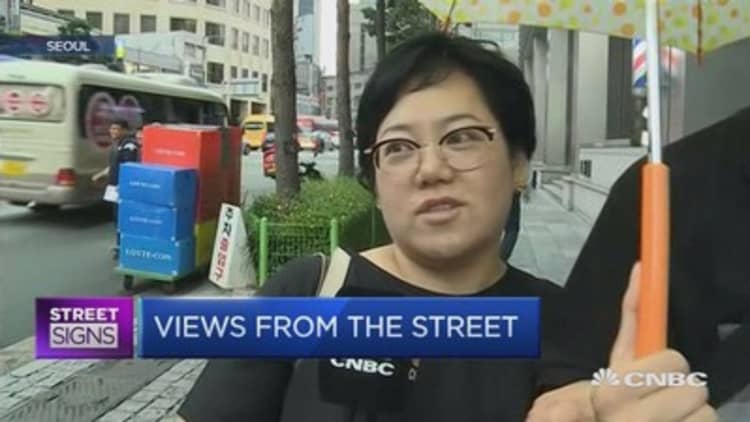
Global markets have finally begun to catch up with the worry that North Korea has aroused in people around the world, but two targets of communist dictatorship remain relatively unfazed.
South Korea, the country closest to Pyongyang's nuclear arsenal, and Guam, the U.S. island that dictator Kim Jong Un enjoys threatening directly, are both monitoring developments closely. But neither is is panicked by the rhetoric out of North Korea.
Guam: 'We feel very confident'
Guam governor Eddie Baza Calvo told CNBC that he's not unnerved, given North Korea's history of menaces.
"There is a lot of concern and some worry, but there's no panic," he said on Wednesday. "This is the third or fourth statement made, since 2013, by [North Korean leader] Kim Jong Un in regards to a direct threat on Guam."
The North Korean military this week said it's planning a missile strike near the Pacific territory, and even provided a mid-August timeline for completing the plans. Guam, which is located about 2,100 miles southeast of North Korea, is home to 163,000 people, a U.S. Navy submarine squadron, a Coast Guard group and an air base.
"Without getting into details, we feel very confident," said Calvo. "We do believe there is a defense umbrella that can protect this island — the American community as well as others."
He pointed to Guam's defense systems as well as THAAD, the U.S. missile defense system being installed in South Korea, as examples.
Given Guam's wartime experience — the island was occupied by Japan during World War II — and strategic location in maritime and travel routes, the territory has long braced itself for hostilities, Calvo said.
Calvo suggested a North Korean attack on Guam was unlikely, given the U.S. retaliation that would follow.
Pyongyang understands the gravity of an attack on American soil and knows such a move would be met with overwhelming force, he explained. "I don't think that would suit the interest of Kim Jong Un, who would like to see the continuation of his regime and his nation," he said.
South Korea: 'Always lived with news like this'
Asia's fourth-largest economy is routinely targeted by North Korean tirades — mockup videos of North Korean missiles blowing up South Korea are commonplace online. But South Korea has long employed a "business as usual" approach to such warnings, given Pyongyang's lack of follow-up.

Several South Korean citizens told CNBC that they aren't frightened by the latest news, suggesting the current crisis was just a repetition of past episodes.
"We've always lived with news like this, so we don't feel that nervous," said Lee Young-ok, who spoke to CNBC in Seoul. "This is the environment many of us have grown up in, North Korea has threatened to attack so many times."
Kim's latest maneuver may just be another form of pressure on Washington, she continued — a theory shared by political scientists.
In fact, she said she believes the U.S. is a bigger concern than Kim. If Trump "pressures the North, I am worried whether that will corner North Korea. Many of former leaders have taken a gentle approach with the North before so I'm concerned whether this will provoke Pyongyang."
Another woman by the name of Choi Yoon-jung believed current tensions would eventually subside.
"I think this is part of our routine in South Korea," she said, adding that in her view, Trump and Kim "will stop this at some point, people lose interest when these leaders are talking about scenarios that go out of common sense."
One South Korean man, Ahn Min-wook, believed in Seoul and Washington's capability to diffuse the situation.
"This time around, North Korea's rhetoric is stronger than usual...But I wouldn't say I'm worried too much because I feel like the leaders of South Korea and the U.S. are getting along very well."


